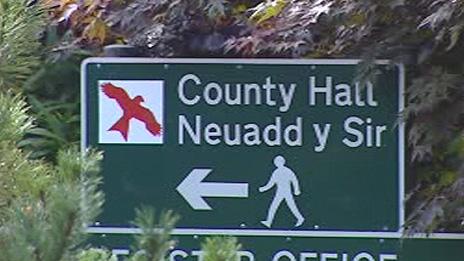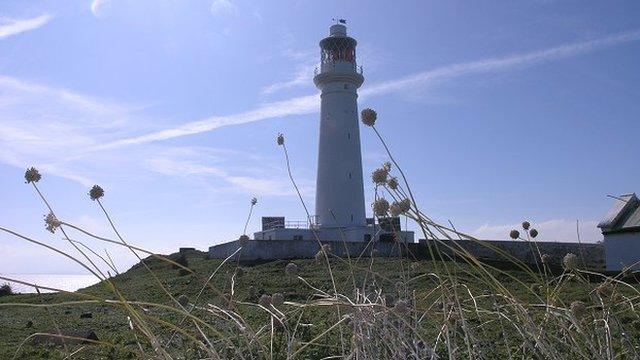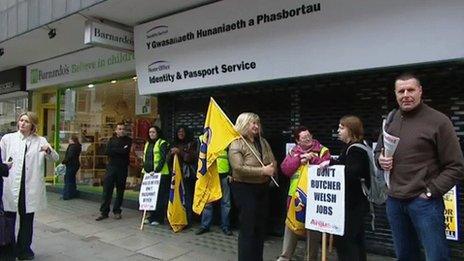Welsh councils cut £145m off spending to set budgets
- Published
Councils are having to make difficult decisions due to squeezed budgets, reports BBC Wales economics correspondent Sarah Dickins
Councils across Wales will cut jobs and services to make up a £145m funding shortfall after setting their budgets.
Cardiff and Powys must each save £22m in 2013-14 with over 400 jobs at risk.
Other councils say they are having to take "tough" decisions with cuts looming in waste collection, arts and libraries as well as grants to community groups and other services.
The Unison union say the figures are a "wake-up call" as the Welsh government says "challenging times" lie ahead.
The UK government's austerity programme has cut the money it gives to the Welsh government which in turn has reduced funding to local government.
Limited reserves
The Welsh government said when the settlements for councils were announced they were "better than they expected".
But Welsh councils, which have been ratifying their budgets for the following financial year, say they have faced difficult decisions to balance the books.
Some like Anglesey have chosen to raise their council tax by 5% to absorb costs while Cardiff is freezing its charges and looking for savings by axing jobs.
On average, council tax in Wales will rise by 2.88% which equates to an additional charge of £27 over the year.
Swansea was one of the first Welsh councils to agree its 2013-14 budget saying it planned to tackle a funding shortfall of £7.7m through "staff reductions" such as early retirement and voluntary redundancy as well as increasing council tax by 3.8% - about a £38 annual rise for Band D property holders - and it will use £2.2m from its reserves.
Dominic MacAskill, regional manager of the trade union Unison and its head of local government in Wales, warns cutbacks will start to be more keenly felt over the years to come.
He said raising council tax can only go so far to cover costs and that more authorities should use reserves although he concedes once spent they are not easily replaced.
"You have reserves for a rainy day and it is pouring out there," he said.
All authorities say crucial frontline services will be protected with the vast majority making efficiency savings and cutting costs internally to balance the books.
There have been protests and demonstrations about some of the councils' more unpopular plans, such as in Newport where the city council has been looking to making £12m in savings, withdrawing some support of the arts and music.
Newport council leader Bob Bright said: "In my 40 years in politics and serving the people of Newport, I have never had to make choices like the ones we have to do now."
Rhondda Cynon Taf warned it may not be able to maintain a weekly waste collection service as it has to meet a £9.6m "gap in funding" and faces even "tougher decisions in other areas" of its operations.
At Torfaen the authority is looking for voluntary redundancies as it needs to save £7.3m.
Its report agreed by councillors, external last week discussed raising the price of school dinners by 5p and increasing charges at residential and nursing homes, along with the cost of cemetery burials and hire facilities at parks.
Ceredigion council is considering changes in the management of public toilets and waste disposal to help find £1.3m in savings.
Vale of Glamorgan council, which is drawing on £1m in reserves as well as making £4.4m in cuts, has been discussing reducing the hours of primary school cooks to save money as well as raising council tax by 4.8%.
Carmarthenshire council has proposed £3.9m in savings, including increasing parking charges, cutting road surface maintenance as well as removing night-time security on its industrial premises.
Powys council, which has 5,000 full-time staff, says it is facing a £30m reduction in its base budget over the next three years after receiving the lowest funding increase in Wales. It says more than 100 jobs are now under threat.
Cardiff council has also said it is looking to axe 300 jobs.
Alternative funding
Union officials said Cardiff council's decision to freeze council tax would hit taxpayers in other ways.
However, a number of services earmarked for closure have been given a temporary reprieve after last minute amendments were tabled ahead of the authority's latest budget meeting.
Splott swimming pool, Plasnewydd Community Centre and a number of lawn bowling clubs will remain open for the next few months as alternative funding methods are explored.
Staffing could be cut at Conwy council as well as a wellbeing support scheme for school children as it looks to save £5.1m.
Monmouthshire, Flintshire and Denbighshire councils say frontline services will not be affected as savings have been found internally.
And Caerphilly council, which has to save £5.1m, describes itself as a "very steady ship" despite "turbulent financial times".
Collaboration call
A Welsh government spokesperson said that when minister Carl Sargeant announced details of the local government settlement he warned the economic climate and cuts in UK government funding meant tough times lay ahead.
"He acknowledged that in these challenging times, protecting local services would not be easy and added that as the coming years are likely to be even more difficult, it is imperative that councils put themselves in the best position to face future challenges by investing in regional collaboration."
The spokesperson added that the settlement to councils in Wales has been better than they expected and better than in England "despite the poor budget that the Welsh government received from the UK government".
"He has delivered on his pledge to increase local authority cash funding over the four-year spending review with a year on year increase of 1.5%, adjusted for transfers and new responsibilities.
"The settlement also delivers on the Welsh government's commitment to protect the most vulnerable in our society and reflects our priorities of protecting schools and social care."
- Published4 March 2013

- Published13 February 2013

- Published21 February 2013

- Published1 February 2013

- Published14 January 2013

- Published11 October 2012

- Published5 October 2012

- Published20 October 2011

- Published6 March 2012
